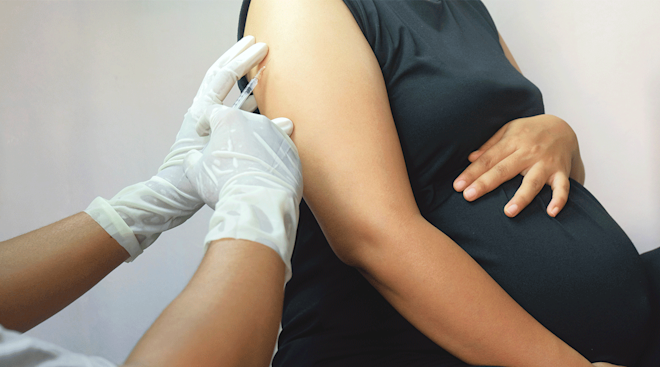How to Safely Treat a Fever During Pregnancy
Having a fever is always a cause for some concern, but a fever during pregnancy can be especially unsettling. When you’re expecting, your immune system naturally changes to support baby’s development, which means you’re more susceptible to getting sick and your symptoms may linger for longer. Plus, you might wonder (and worry) about whether your fever will affect baby. Here, experts break down everything you need to know about fevers during pregnancy, including how to treat them to keep both you and baby healthy.
A fever is clinically defined as having a temperature of 100.4 degrees Fahrenheit or greater. But, of course, there’s a range of severity. A person’s normal body temperature is 98.6 degrees, so any temperature above that could classify as a fever (albeit a mild one), says Christine Greves, MD, an ob-gyn at the Orlando Health Winnie Palmer Hospital for Women & Babies in Orlando, Florida. “We usually consider a fever something that needs extra attention if it’s over 102 degrees,” she adds.
The symptoms for a fever during pregnancy are the same as they would be if you weren’t expecting. “Being pregnant shouldn’t alter that,” says Julie Lamppa, CNM, RN, a certified nurse midwife at Mayo Clinic. These symptoms include:
- Chills
- Shivering
- Feeling hot and flushed
- Muscle aches
- Sweating
- Loss of appetite
- Dehydration
- Irritability
- Weakness
Wondering how baby might be affected by your fever? Rest assured, just because you’re sick, it doesn’t mean baby is also infected. Rather, the risks depend on how high your temperature gets. When you have a fever, your internal body temperature rises, which can also increase baby’s temperature. “When a fetus becomes too warm, their heart rate may increase,” Lamppa says. However, “this is usually temporary and shouldn’t cause any long-term concerns,” she adds.
A low-grade fever usually isn’t something to be too concerned about. That said, if a woman has a prolonged fever due to an infection, there’s a chance it could harm baby, Greves notes. That’s also true if your temperature spikes in the first trimester, since a fever in early pregnancy—a critical period of fetal development—can increase the odds that baby could develop neural tube defects and other congenital abnormalities, Lamppa says.
Regardless of pregnancy, a fever is always a symptom of an underlying cause. “You need to ask why this person is having a fever,” Greves says, adding there could be a few reasons behind it. Maybe it’s just because you have a little cold—in which case, the odds of your fever affecting your pregnancy are really low, Greves adds. Other common culprits behind a fever in pregnancy include the flu, a urinary tract infection, a kidney infection and a stomach bug. But it’s also possible to have a fever due to something more serious like listeriosis (a bacterial infection), toxoplasmosis (a parasitic infection) or encephalitis (an inflammation of the brain), she says. “That’s when the fever can be a problem—because of the reason behind it,” Greves explains. For your health and baby’s, it’s important to alert your doctor of your symptoms.
According to Lamppa, it’s generally okay to take acetaminophen (Tylenol) when you have a fever during pregnancy. Putting a cool washcloth on your forehead may help you feel better too. But the best way to help treat a fever during pregnancy is to make sure you stay well hydrated and get a lot of rest, she adds.
Things you shouldn’t take for a fever in pregnancy include aspirin and ibuprofen (i.e., Advil or Motrin), or, according to Greves, any herbal medication. “This is a very important period of time, and we don’t have any controlled studies that say herbal medications are safe,” she explains.
Call your doctor if your fever doesn’t come down with Tylenol or if you notice an increase in contractions, abdominal pain or tenderness, loss of fluid or decrease in fetal movement, Lamppa says. And, of course, don’t hesitate to check in with your doctor if you have any concerns at any point. Fevers in pregnancy can be unsettling, but rest assured that with timely care and treatment, you’ll feel better soon and baby will be okay.
Please note: The Bump and the materials and information it contains are not intended to, and do not constitute, medical or other health advice or diagnosis and should not be used as such. You should always consult with a qualified physician or health professional about your specific circumstances.
Plus, more from The Bump:
Christine Greves, MD, FACOG, is an ob-gyn at the Orlando Health Winnie Palmer Hospital for Women & Babies in Orlando, Florida. She received her medical degree from the University of South Florida College of Medicine.
Julie Lamppa, CNM, APRN, is a nurse midwife at the Mayo Clinic and clinical instructor in the Department of Obstetrics and Gynecology at the Mayo Clinic College of Medicine and Science. She served as a labor and delivery nurse for 15 years prior to earning her master’s degree in midwifery in 2009.
Learn how we ensure the accuracy of our content through our editorial and medical review process.
Navigate forward to interact with the calendar and select a date. Press the question mark key to get the keyboard shortcuts for changing dates.


















































